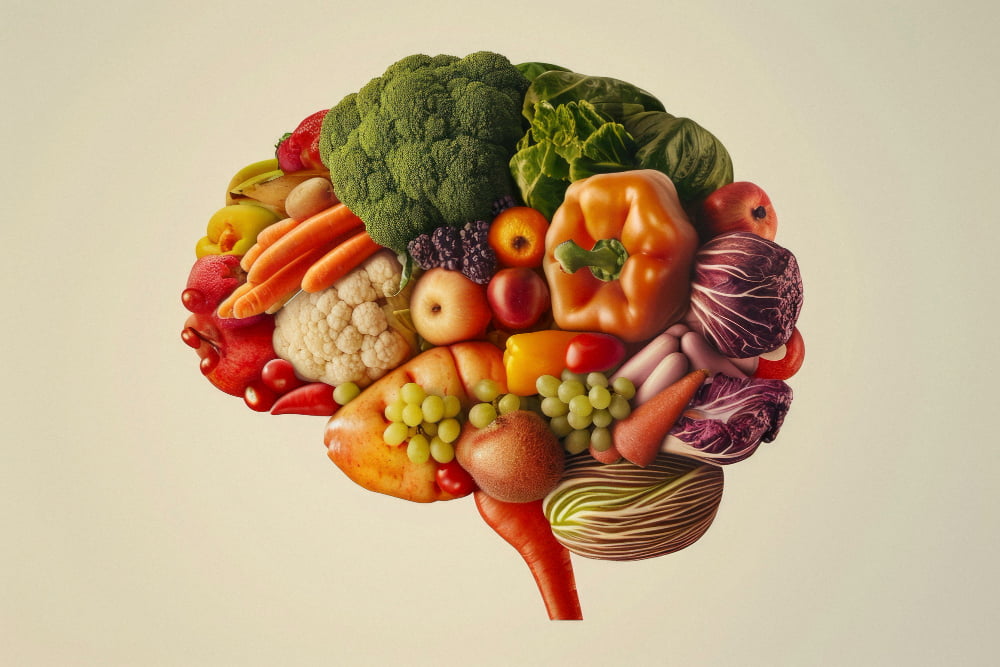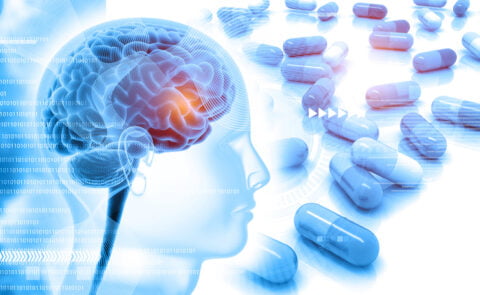Our brain, the most sophisticated organ in the body, controls everything we do, including thinking, feeling, moving, and remembering. To function efficiently, the brain, like any high-performance machine, requires the correct fuel. Here, we look at the fascinating relationship between nutrition and brain health, as well as the ideal foods to support cognitive performance.
Understanding the impact of olive oil on Brain Health
Olive oil, a cornerstone of the Mediterranean diet, is not only delicious but also has excellent brain-protective effects. Olive oil contains monounsaturated fats, particularly oleic acid, which may improve cognitive function and memory. According to studies, it can increase blood flow to the brain, decrease inflammation, and protect brain cells from injury. To gain the brain-boosting advantages of olive oil, drizzle it on salads and vegetables or use it in light cooking.
Choosing the best dark chocolate for Brain Health
Dark chocolate is a delicious treat with surprising cognitive advantages. For the greatest cognitive impact, choose dark chocolate with at least 70% cacao content. This type of chocolate contains flavanols, antioxidants that increase blood flow to the brain and may boost memory and learning. Remember that moderation is crucial. A tiny square or two of high-quality dark chocolate will provide a wonderful cognitive boost.
Identifying the ultimate Brain Food
There is no single “ultimate” brain meal. A well-balanced diet rich in numerous nutrients is essential for proper brain function. However, some meals have a particularly powerful combination of brain-boosting qualities. Fatty fish such as salmon and sardines are excellent for brain health. They contain a high concentration of omega-3 fatty acids, which are important for cognitive function, memory, and the prevention of dementia.
Selecting natural foods for Brain Health
Whole, unprocessed foods are nature’s gift for brain health. Colorful fruits and vegetables are high in antioxidants, which help nourish brain cells and reduce inflammation. Leafy greens, such as kale and spinach, are high in vitamins K and E, which are vital for cognitive function. Include whole grains in your diet, such as brown rice and quinoa, to provide you with energy and attention throughout the day.
Crafting a brain-heart-body diet
The good news is that what’s great for your brain usually benefits your heart and general health. The Mediterranean diet, which focuses on fruits, vegetables, whole grains, and healthy fats like olive oil, and seafood, is an excellent example. This food pattern has been related to better cognitive performance, lower risk of heart disease, and general health.
Unveiling the power of superfoods for brain function
Superfoods are nutrient-dense foods that offer numerous health benefits.
Here are some superfoods to consider include in your diet for a brainpower boost:
- Fatty fish are high in omega-3 fatty acids, which help with memory and focus.
- Berries include antioxidants that preserve brain cells.
- Nuts and seeds are high in healthy fats, vitamin E, and B vitamins, all of which help with cognitive performance.
- Avocados: Healthy fats promote brain cell health and function.
- Whole grains provide constant energy for healthy brain performance.
- Dark leafy greens: High in vitamins K and E, which promote cognitive function.
- Eggs: Choline is vital for memory and learning.
- Dark chocolate: Flavanols promote blood flow and may boost memory.
- Green tea contains L-theanine, which enhances focus and alertness.
- Turmeric: Turmeric contains curcumin, which has anti-inflammatory qualities that improve brain health.
Incorporating anti-inflammatory foods for brain health
Chronic inflammation has been connected with cognitive impairment. Consuming anti-inflammatory foods can help protect your brain. Fatty fish, antioxidant-rich fruits like berries and cherries, and veggies like tomatoes and broccoli are all great options. Furthermore, spices such as turmeric and ginger have strong anti-inflammatory properties.

Optimal protein sources for brain function
Protein is necessary for the development and repair of brain cells. Lean protein sources such as fish, chicken, beans, and lentils provide a continuous supply of amino acids, which are the building blocks of protein. These amino acids are essential for neurotransmitter synthesis, which affects mood, learning, and memory.
Evaluating the nutritional value of egg yolk
Egg yolks have been blamed for their high cholesterol content. However, current evidence reveals they have cognitive benefits. Egg yolks are high in choline, an essential vitamin for memory and learning. They also include vitamin B12, which is required for proper nerve function and cognitive wellness. Include eggs in moderation as part of a healthy diet.
Essential vitamins and foods for Brain Health
- Vitamin B12 is found in fish, poultry, dairy products, and fortified cereals. It is essential for nerve function and cognitive functioning.
- Vitamin D: Fatty fish, eggs, and fortified milk are excellent sources. Vitamin D insufficiency has been associated with cognitive impairment.
- Vitamin E: Nuts, seeds, avocados, and olive oil contain vitamin E, an antioxidant that protects brain cells from harm.
- Vitamin K: Leafy green vegetables have high levels of vitamin K, which aids memory and learning.
- Green green vegetables, beans, lentils, and fortified grains are excellent sources of folate. It is essential for brain growth and cognitive function.
Exploring brain-boosting breakfast options
Breakfast provides fuel for your morning. Choose brain-boosting foods such as oatmeal with berries and nuts, a smoothie made with spinach, banana, and yoghurt, or whole-wheat bread with eggs and avocado. These options provide essential proteins, energy, and healthy fats to get your brain going for the day.
Assessing the role of bananas in Brain Health
Bananas are a simple and useful source of natural energy. They include potassium, a mineral that regulates blood pressure and increases blood flow to the brain. Furthermore, bananas contain easily digestible carbohydrates, that are the brain’s primary energy source.
Discovering the top fruit for Brain Health
While all fruits have health advantages, berries are especially known for their brain-boosting characteristics. Berries are high in antioxidants known as anthocyanins, which may aid memory and learning while also protecting brain cells from injury. Blueberries, strawberries, raspberries, and blackberries are all great options.
Uncovering the top 5 Brain Foods
Here are the top five brain foods based on their well-rounded nutritional profile and brain-protective properties:
- Fatty Fish: High in omega-3s, vitamin D, and healthful fats.
- Berries contain antioxidants, anthocyanins, and vitamin C.
- Leafy Greens: High in vitamin K, E, folate, and antioxidants.
- Nuts and Seeds: Rich in healthy fats, vitamin E, B vitamins, and minerals.
- Whole Grains: They provide sustained energy, fibre, and B vitamins that help with brain function.
Evaluating the brain benefits of oatmeal
Oatmeal is an excellent brain food option. It’s a whole grain high in complex carbs, which offer extended energy to the brain. Oatmeal also contains fibre, which helps control blood sugar levels, supporting steady attention and concentration. Steel-cut or rolled oats offer the biggest nutritional benefits.
Choosing brain-boosting beverages
Staying hydrated is crucial for proper brain function. Water is always the greatest option. However, other beverages have additional brain-boosting benefits:
- Green tea contains L-theanine, which enhances focus, alertness, and relaxation.
- Coffee: Caffeine in coffee can help with alertness, focus, and cognitive performance in moderation.
- Berry Smoothies are a tasty way to mix brain-boosting fruits and yogurt for extra protein and probiotics.
Identifying the best drink for Brain Function
Plain water is the preferred beverage for overall hydration and brain health. However, combining brain-boosting beverages such as green tea, coffee (in moderation), or berry smoothies with water can bring additional cognitive benefits.
Recognizing foods that trigger anxiety
Certain meals might trigger anxiety symptoms. Here are a few to be aware of:
- Processed foods, which are frequently high in harmful fats, added sugars, and sodium, can increase anxiety symptoms.
- Caffeine (excess) While moderate coffee use has benefits, too much caffeine can cause anxiety and jitters.
- Alcohol: Alcohol might impair sleep and exacerbate anxiety symptoms.
- Refined carbohydrates: Sugary beverages, pastries, and white bread can induce blood sugar spikes and drops, resulting in anxiety and mood changes.
Frequently Asked Questions
A: Extra virgin olive oil is rich in antioxidants and healthy fats, particularly oleic acid. Research suggests these may help protect brain cells from damage and inflammation, potentially reducing the risk of cognitive decline and Alzheimer’s disease.
A: The darker the chocolate, the higher the cocoa content and flavanols, which are beneficial for brain function. Aim for at least 70% cocoa content. Milk chocolate has lower flavanols due to added milk fat.
A: There’s no single “superfood” for the brain. A well-balanced diet rich in various brain-healthy nutrients is key. However, some foods offer a wider range of benefits.
A: Several natural foods are excellent for brain health:
Fatty fish: rich in omega-3s, crucial for brain function and memory.
Berries: packed with antioxidants that protect brain cells.
Leafy greens: high in vitamins and minerals that support cognitive function.
Nuts and seeds: good source of healthy fats, vitamin E, and antioxidants.
A: Diets like the Mediterranean and DASH diets emphasize:
Fruits and vegetables: rich in antioxidants and essential nutrients.
Whole grains: provide sustained energy for brain function.
Healthy fats: from sources like olive oil and fish.
Lean protein: supports brain development and repair.
A: While not a definitive list of 10, here are some powerful options:
Fatty fish (salmon, tuna)
Blueberries
Nuts (walnuts, almonds)
Leafy greens (spinach, kale)
Dark chocolate (70%+)
Eggs
Avocados
Whole grains (brown rice, quinoa)
Tomatoes
Olive oil
A: Chronic inflammation can harm brain cells. Anti-inflammatory foods like:
Fatty fish
Fruits (berries, cherries)
Vegetables (tomatoes, broccoli)
Nuts and seeds
Olive oil
A: Lean protein sources rich in specific amino acids are beneficial:
Fatty fish: provides omega-3s for brain cell health.
Eggs: contain choline, important for memory and learning.
Chicken and turkey: lean protein source with B vitamins for cognitive function.
Beans and legumes: good source of plant-based protein and B vitamins.
A: Egg yolks are rich in choline, essential for memory and learning. They also contain vitamin B12, important for brain function and preventing cognitive decline.
B vitamins: found in whole grains, legumes, and leafy greens, support cognitive function and memory.
Vitamin D: from fatty fish and fortified foods, may help protect against dementia.
Vitamin E: found in nuts, seeds, and avocados, has antioxidant properties that may protect brain cells.
Omega-3 fatty acids: from fatty fish and nuts, crucial for brain cell development and function.




